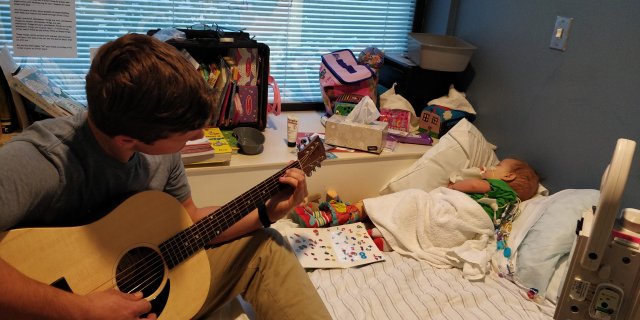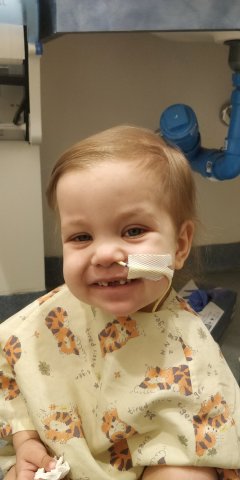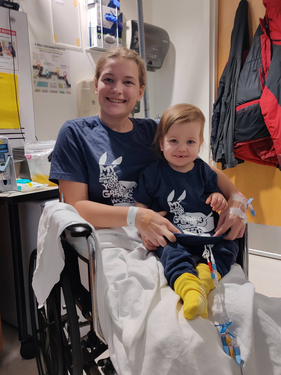There may be a later update tonight, but it's my bedtime, and three of Grace's four brothers are visiting, so I don't really expect Heather and Jon to have time to write. But I can give you a little.
- The attending physician rotates every two weeks, and most of them are great, but they are having problems with one; please pray for better understanding and communication.
- So many of the people attending to Grace keep changing around, but their social worker and her "child life specialist" provide much-needed continuity and advocacy. I'm gaining more respect for these positions than I had previously.
- Hospital volunteers, too, can be worth their weight in gold, giving parents much-needed breaks to attend to their own mental and physical health.
- I am so grateful for Boston Children's liberal visitation policies. The opportunity for Grace to see her siblings is so good for her mental health, and good mental health, I'm convinced, is crucial for physical health.
- Life is not all seriousness in this very serious time: Jon and the boys took the opportunity of their visit to spend the afternoon at Boda Borg!
- Grace is struggling with pain, though morphine "pushes" perk her back up again. They had stopped the continuous morphine, perhaps a little too soon. The mere thought of that little girl dependent on morphine tears me apart. I have to assume the doctors know what they're doing, and I certainly understand that pain can interfere with healing. But I hope that she won't need it for very long.
- Her ANC was up to 330 today, a good jump from the 100-200 it's been for several days. We pray that those new cells will get right to work healing her gut!
- When she gets to 500 she will have reached the "engrafted" stage.
Permalink | Read 739 times | Comments (2)
Category Pray for Grace: [first] [previous] [next] [newest]
I've long known, and been troubled by the fact that nearly all of our vitamin C comes from China.
It's not that I'm against trade with China. When two powerful enemies have a thriving trade relationship, they are much less likely to seek to blow each other to bits.
On the other hand, China's terrible reputation when it comes to health and safety, environmental, labor, and human rights concerns really ought to be taken more seriously, especially when it comes to what we ingest.
I'm sufficiently convinced of the value of vitamin C in preventing/mitigating illness that it's a regular part of my health routine. As I said to one of my doctors, who agreed that he followed a similar philosophy, "I don't care if it's only the placebo effect—the placebo effect itself turns out to be effective about a third of the time." For that reason, I've been seeking a non-Chinese alternative to vitamin C.
I think I've found one: LifeSource Vitamins.
It from no one's recommendation, no advertisement, nothing but a simple internet search on "vitamin c not from China." So this is not a review, nor an endorsement of all they offer. But their vitamins do not come from China, and what's more, they're local (just across town in Winter Park). That was good enough for me to give them a trial. I ordered their 500mg vitamin C, and also decided to try some multivitamins and minerals. The latter is a whole lot more than just vitamins; I reproduce the back label here, not only for your information, but so I can easily read it when I want to; to read the actual label I have to resort to a magnifying glass.

I have no idea what good all these various things are supposed to do for me. (Chlorella Cracked Cell Wall Powder, anyone?) I'll let you know if I can suddenly leap tall buildings in a single bound. I'm more interested in the more ordinary ingredients, and will note that the "serving size" is three tablets (you're supposed to take one with each meal), so if some of these percentages look a little high to you, it's easy to take just one.
And that's another thing I like about these vitamins: they are easy to take, period. I don't generally have trouble swallowing pills, but often have a real problem with vitamin C tablets. For whatever reason, they sometimes stick in my throat, causing me to choke and/or vomit. It's not pleasant to feel I'm rolling the dice everything I swallow a vitamin. These vitamin C tablets, however, don't have the customary rough coating, but are smooth—and slide right down.
As I said, this can hardly be a review of the product at this point—why do companies ask for reviews from people who can't possibly have enough experience to say more than, "Yep, it arrived in good time and the packaging was intact"? But I asked for non-Chinese vitamin C, and I'm grateful to have found some.
So I'm passing along the information the best way I know.
The Elfun Society was an organization related to the General Electric Company. My father worked for GE from college graduation to retirement, and he and my mother would occasionally go to Elfun Society special events. On January 18, 1966, they attended a program featuring Peter Jennings as the speaker. Jennings was 27 years old at the time, and only one year into his job as ABC anchorman. Dad, in his journal, remembers him as a young Canadian, "witty when he wanted to be and also very serious when he wanted to be."
Here are a couple of things he found memorable.
He started his talk by referring to President Johnson's favorite phrase when some negotiating needs to be done: "Come, let us reason together." He said that a little research shows that this comes from the Bible, the first chapter if Isaiah, 18th verse: "Come, let us reason together, saith the Lord." That brought down the house, and then he read further. In effect, the Lord then says that those who do things his way will be rewarded, and those that do not will be "devoured by the sword."
Knowing more now about our 36th president, I'd say Jennings was pretty astute about American politics for a Canadian in his mid-20's!
The following is an old joke, but then again, this was almost 60 years ago, so who knows?
He also commented that as far as his own political views are concerned, he is not a member of any organized political party—he is a Republican.
It was clearly intended to be a joke. Jennings would not become an American citizen until nearly 40 years later, so was unlikely to have been directly involved in American politics. But it reminds me of something else he said that night. Dad did not write it in his journal, but quoted it enough times afterwards that I've never forgotten. What Jennings said was that journalists are always trying to portray themselves as neutral and unbiased in political matters, but that's impossible. One's own biases always come through in the reporting. What is important, Jennings said, is to be upfront about where you are coming from, so the audience can take your prejudices into account. I've always thought he was right about that, but I surely do miss the days when those who reported the news at least gave lip service to fairness, instead of the can't-distinguish-news-reporting-from-editorial-comments circus we have today.
From Heather tonight:
Please pray for Grace's intestines to heal. The doctor is concerned about her continued diarrhea, and so stopped all formula feeds for a few days. She's getting all her nutrition through IV. She will eat bites of things here and there, but is not really taking things by mouth either. This is expected, but the sooner we can get her back to digesting the normal way, the better.
Permalink | Read 604 times | Comments (0)
Category Pray for Grace: [first] [previous] [next] [newest]
The headline was admittedly clickbait: I’m QUITTING Gardening After Reading THIS, So Should YOU. And it caught me. I actually suspected that it didn't mean what it sounded like, and in the process I discovered another interesting YouTube channel.
After his brief rant, we get to see him transplanting fruit trees, dealing with gophers, demonstrating his "weedeater," and more.
On Monday, Heather told me that Grace was acting much more like herself, and in yesterday's update, Jon proclaimed, "Grace had a great day today." We can't say enough how much we appreciate (and depend on) all your prayers and good wishes.
Tangible prayers!
People have been so generous with time, effort, and gifts. The kids are eating very well back home, with people bringing meals nearly every day of the week, and generous DoorDash gift cards are enabling Heather and Jon to enjoy some of Boston's wonderful restaurants—time, not money, is their biggest constraint.
- Grace's white cell counts are on the rise: 0, 30, 60, 115..., which means Faith's cells are becoming her own and getting down to work.
- Formerly open sores are visibly healing.
- She is still sleeping a lot, but less than the previous 12-16 hours a day.
- She's now enjoying the playroom again, and going for walks up and down the hall.
- She still relies on her central line and her NG tube for nutrition, but keeps trying to eat. Apparently her taste buds are weirded out, because she tends to take a bite then spit the food out again. This is considered normal.
Permalink | Read 862 times | Comments (0)
Category Pray for Grace: [first] [previous] [next] [newest]
Since 2010, I've been keeping a record of the books I read. During this time, I've averaged 68 books per year; the smallest annual total was 33 in 2011, and the largest 108 in 2018. In 2023 I barely beat my lowest count, reading only 35 books. I really can't account for it, other than to say that life happens. We travelled a lot, family matters took up a lot of time and energy, and a couple of projects took priority (I'd like to say that one of those projects was genealogy, but that's another area that got neglected). However, nothing stands out as a reason to have read fewer than three books per month. Here's to a better 2024!
The stats from 2023:
- Total books: 35
- Fiction: 28 (80%)
- Non-fiction: 7 (20%)
- Months with most books: November (6)
- Month with fewest books: October (0)
- Most frequent authors: Brian Jacques and J.R.R. Tolkien each had four; Jeff Wheeler, Trenton Lee Stewart, and Zenna Henderson had three; other than that it was ones and twos. As I said, it was a slow year.
- Interesting fact: Nine of the 35 books I read on the recommendation of grandchildren, six were recommended by an author friend, and many of the others were an indulgence in books/authors from my childhood. I'm not making much progress on my extremely long "To Read" list, but I am having fun.
Here's the list, sorted by title; links are to reviews. The different colors in the titles only reflect whether or not you've followed a hyperlink. The ratings (★) and warnings (☢) are on a scale from 1 to 5, with 1 being the lowest/mildest. Warnings, like the ratings, are highly subjective and reflect context, perceived intended audience, and my own biases. They may be for sexual content, language, violence, worldview, or anything else that I find objectionable. Nor are they completely consistent. For example, Brandon Sanderson's books could easily rate a content warning in all of the above categories, yet they are mostly not inappropriate to the context and could be considered quite mild—for a modern book. Your mileage may vary.
| Title | Author | Category | Rating/Warning | Notes |
| Antifragile | Nassim Nicholas Taleb | non-fiction | ★★ | Really hard to rate this. Some very interesting ideas, but the style is as confusing to me as Joyce's "Ulysses," so I didn't get much out of it. |
| The Anything Box | Zenna Henderson | fiction | ★★★ | |
| The Art of Evil | Blair Bancroft | fiction | ★★★★ ☢ | Almost a must-read for visiting the Ringling Museum in Sarasota. Language and mild sexual references. |
| At First Light | Barbara Nickless | fiction | ★★★ ☢ | |
| Badger Hills Farm 0: Timothy of the 10th Floor | Jenny Phillips | fiction | ★★★★ | Good story, but intended for school so the format is annoying. |
| The Bible: Apocrypha | non-fiction | ★★★★ | Revised Standard Version | |
| The Bible: New Testament | non-fiction | ★★★★★ | King James Version | |
| The Bible: Old Testament | non-fiction | ★★★★★ | King James Version | |
| The Black Stallion Returns | Walter Farley | fiction | ★★★★ | |
| Captain Cook | Alistair MacLean | non-fiction | ★★★★ | |
| The Christmas Train | David Baldacci | fiction | ★★★ | |
| Force 10 from Navarone | Alistair MacLean | fiction | ★★★★ | |
| The Guns of Navarone | Alistair MacLean | fiction | ★★★★ | |
| The Hobbit | J. R. R. Tolkien | fiction | ★★★★★ | |
| Holding Wonder | Zenna Henderson | fiction | ★★★ | |
| A Hunter-Gatherer's Guide to the 21st Century | Heather Heying and Bret Weinstein | non-fiction | ★★★★ | Lots of good, a small amout bad, some weird. |
| Is It Always Fun to Travel Abroad? | Antonio Morales-Pita | non-fiction | ★★ | |
| The Island Stallion | Walter Farley | fiction | ★★★★ | A huge favorite from childhood. |
| Jack Zulu and the Waylander's Key | S. D. Smith and J. C. Smith | fiction | ★★★ | Interesting story, weak in places, some very nice spots. |
| Kingfountain 1: The Queen's Poisoner | Jeff Wheeler | fiction | ★★★★★ | An absolute delight. |
| Kingfountain 2: The Thief's Daughter | Jeff Wheeler | fiction | ★★★ | Mostly great, but too much romance. |
| Kingfountain 3: The King's Traitor | Jeff Wheeler | fiction | ★★★★ | Not quite as good as the first book, but still excellent. |
| The Lord of the Rings 1: The Fellowship of the Ring | J. R. R. Tolkien | fiction | ★★★★★ | Always worth re-reading. |
| The Lord of the Rings 2: The Two Towers | J. R. R. Tolkien | fiction | ★★★★★ | |
| The Lord of the Rings 3: The Return of the King | J. R. R. Tolkien | fiction | ★★★★★ | |
| Maigret and the Apparition | Georges Simenon | fiction | ★★★ | |
| MBS 1: The Mysterious Benedict Society | Trenton Lee Stewart | fiction | ★★★★★ | |
| MBS 2: The Mysterious Benedict Society and the Perilous Journey | Trenton Lee Stewart | fiction | ★★★★ | |
| MBS 3: The Mysterious Benedict Society and the Prisoner's Dilemma | Trenton Lee Stewart | fiction | ★★★★ | |
| Menace at Lincourt Manor | Blair Bancroft | fiction | ★★★★ | |
| Poems and Uncollected Stories | Zenna Henderson | fiction | ★★★ | |
| Redwall 9: Pearls of Lutra | Brian Jacques | fiction | ★★★★★ | |
| Redwall 10: The Long Patrol | Brian Jacques | fiction | ★★★★★ | |
| Redwall 11: Marlfox | Brian Jacques | fiction | ★★★★★ | |
| Redwall 12: The Legend of Luke | Brian Jacques | fiction | ★★★★ |
There hasn't been a lot of news from Boston in the last few days. The time immediately after a bone marrow transplant is especially hard; Grace has been suffering and her parents are exhausted.
But today, Day +10, there is some light, and an update. (Heather's version of the story is here.)
This weekend, Grace's oldest brother, Jonathan, came to visit. I know she has been missing him a lot, and have no doubt that his presence was as important in its own way to her healing as the many medications she is receiving.
What's more, he was able to stay with her overnight, and give Heather and Jon some much-needed time together—healing for their own hearts!
It's a good thing Jonathan also plays the guitar, as his French horn playing, though beautiful, might not go over so well in the hospital.
Yesterday, Grace did not throw up at all, seemed to be doing better, and even managed some smiles. Many things are going on in her body, so it's impossible to pin down any single cause for her improvement, but my guess is that one factor was switching out morphine for Tylenol. Faith reacted badly to the morphine they gave her after harvesting her marrow, so it wouldn't surprise me if Grace had similar sensitivities. At any rate, at last word she was doing better without it.
Permalink | Read 823 times | Comments (2)
Category Pray for Grace: [first] [previous] [next] [newest]
If you know me, you know I'm not a fan of the Contemporary Christian Music genre, and when possible avoid worship services that feature so-called praise bands and praise songs. But many of these songs have staying power. (Less charitably, they have a tendency to become earworms.) Like memorized prayers, they can be a powerful help in hard times.
Right now, this is a good one. Here's a different version from the one I posted in my first post about Grace's leukemia.
I'm told that the first two weeks after a bone marrow transplant are the worst, so this reminder seems appropriate.
Permalink | Read 895 times | Comments (1)
Category Pray for Grace: [first] [previous] [next] [newest]
Today it has been a week since Grace's transplant.
I've not been regular with my updates recently, for the very good reason that we've been in Switzerland—a trip arranged Before Diagnosis—visiting Heather's sister and her family. Heather emphatically did not want us to change our plans, so off we went. After all, we can pray just as well from 4500 miles away as from a "mere" 1400 miles. And if prayers ascend faster from 40,000 feet in the air, we had that covered.
It was a very enjoyable visit, so great to see everyone there, and to meet our new granddaughter, now three months old and incredibly cute and good-natured. As you might expect, keeping up with a lively family of seven did not leave much time for blogging, especially since it had do be done painfully slowly on my phone, as we had left our computers behind.
Here are links to the Daley Ponderings posts that I missed, with my quick summaries.
Day +1 Faith has some major pain to deal with, but improves enough to be discharged to their apartment. With the oral meds put on pause, Grace is able to eat well and not vomit, but she starts getting the expected mouth sores and intestinal side effects.
Wanting to eat but not keeping it down Jon celebrates his birthday by attending Park Street Church and taking Faith home to New Hampshire. Heather is tired. Grace's diaper rash might be a bit better, but she continues to have intestinal problems, and she sleeps a lot. Her appetite is still good, but she can't keep food down.
Better but hard Day +4. Grace did not throw up all day. She has mucositis in her mouth and intestines, but not too badly.
NG tube no fun Big brother Jeremiah celebrates his birthday by coming to visit, Grace acquires an NG tube to help with meds and nutrition, but is generally feeling pretty miserable. Photo alert!
That's the last of their updates for the moment. Heather took Jeremiah home yesterday and is making an effort both to rest and to catch up with home things before she goes back tomorrow. Jon could use extra prayers: He's on his own in Boston and Grace is not feeling well at all.
Permalink | Read 908 times | Comments (0)
Category Pray for Grace: [first] [previous] [next] [newest]
(This post was originally to be an update, but I got interrupted while writing, and in my haste to save my work, I accidentally posted the picture with an interim title. Before I could get back to it, it took on a life of its own. So I'm leaving it up, but with a new title and some added text.)
We love the Green Ember books by S. D. Smith. There is an oath that is an essential part of the stories, and it begins, My place beside you, my blood for yours. This photo was taken in Transplant Day, and since Faith was literally giving her blood for Grace's, they wore their Green Ember oath shirts for the occasion.
Fun fact: Although Faith and Grace are perfect matches when it comes to a bone marrow transplant, they had different blood types. The transplant changes Grace's to be the same as Faith's.
Permalink | Read 857 times | Comments (1)
Category Pray for Grace: [first] [previous] [next] [newest]
I'm the kind of person who sees standardized, multiple-choice tests as fun puzzles. I always did well on them—but only because I learned to shut down that part of my brain that delighted in finding alternative answers, in favor of that part that could discern which answer was probably in the minds of the test-makers.
My gut wanted this t-shirt.
Sadly, the other part of my brain overruled it, insisting that there is a valid and important place for politics in our lives. What I need is a shirt that says,
Turning
Everything
into
Politics
Ruins
Everything
A case in point:
Back in 2014, I was introduced to the hymn, Lift Every Voice and Sing. Here's what I had to say about it 10 years ago.
We arrived early at church, and having discovered that the processional hymn was a new one to us, I plunked it out on the piano several times before the director arrived. It may sound easy, but it is decidedly not if you've never heard it before. Mercifully, he took it down a whole third from what is written in our hymnal.
I would never have guessed that Lift Every Voice and Sing was an African-American song, much less the "Black National Anthem" as it is sometimes called. Not knowing the tempo at which it is apparently usually sung (judging by the YouTube recordings I listened to), I took it at a faster clip, and would have guessed it to be a World War I era song, or maybe something from the Salvation Army. If you listen to it and note that the middle part sounds like the more militant parts of Les Miserables, be assured that this was written 'way back in 1899/1900 by James Weldon Johnson and his brother John Rosamond Johnson.
Our church usually sings that hymn on a Sunday near to the Martin Luther King Jr. holiday, and I love it, despite the fact that I'm not really comfortable with singing it in a worship service. I get uncomfortable when we sing music in worship that honors secular occasions, such as Independence Day, Veterans Day, Mothers Day, etc. I can't really say it's wrong, but it makes me uncomfortable.
Nonetheless, Lift Up Your Voice and Sing is a powerful song, and I was excited a few weeks ago when I learned that it is going to be performed during this year's Super Bowl. I made a comment to that effect, and was shocked at the can of worms I opened. First of all, I revealed my complete ignorance of football games in general and the Super Bowl in particular, by stating that I sure hoped they would sing all the verses, because the words are very important for our time. How was I supposed to know that the attention spans of football fans are so small they wouldn't tolerate more than one verse? (There are only three.)
There are some songs in which some verses can be removed without doing damage to the meaning—and other songs where that is decidedly not true. You'd be amazed at how often a church will sing only the first verse of A Mighty Fortress Is Our God, which leaves off at a most unfortunate place.
A mighty Fortress is our God,
A Bulwark never failing;
Our Helper He amid the flood,
Of mortal ills prevailing.
For still our ancient foe
His craft and power are great,
And armed with cruel and hate,
On earth is not his equal.
I mean, really? You want to stop there?
Our own Star Spangled Banner, when sung, almost never includes my favorite verse:
Oh! thus be it ever, when free men shall stand
Between their loved home and the war's desolation!
Blest with vict'ry and peace, may the heav'n-rescued land
Praise the Pow'r that hath made and preserved us a nation.
Then conquer we must, when our cause it is just,
And this be our motto: "In God is our trust."
And the star-spangled banner in triumph shall wave
O'er the land of the free and the home of the brave!
Lift Every Voice and Sing deserves (and needs) all of its verses.
But worse was yet to come. I then learned that the singing of this song had become a football of the political variety. I don't know what all was said; I'm deliberately avoiding it, and I certainly will be avoiding the Super Bowl for other reasons. But it's a shame, because this is a marvellous anthem full of faith, hope, caution, history, and patriotism, suitable for anyone who has struggled through difficulties and still faces challenges.
So here, since you are highly unlikely to hear them performed at the upcoming game, are all the verses of Lift Up Your Voice and Sing.
Lift every voice and sing,
’Til earth and heaven ring,
Ring with the harmonies of Liberty;
Let our rejoicing rise
High as the listening skies,
Let it resound loud as the rolling sea. Sing a song full of the faith that the dark past has taught us,
Sing a song full of the hope that the present has brought us;
Facing the rising sun of our new day begun,
Let us march on ’til victory is won.
Stony the road we trod,
Bitter the chastening rod,
Felt in the days when hope unborn had died;
Yet with a steady beat,
Have not our weary feet
Come to the place for which our fathers sighed.
We have come over a way that with tears has been watered,
We have come, treading our path through the blood of the slaughtered,
Out from the gloomy past,
’Til now we stand at last
Where the white gleam of our bright star is cast.
God of our weary years,
God of our silent tears,
Thou who has brought us thus far on the way;
Thou who has by Thy might
Led us into the light,
Keep us forever in the path, we pray.
Lest our feet stray from the places, our God, where we met Thee,
Lest our hearts drunk with the wine of the world, we forget Thee;
Shadowed beneath Thy hand,
May we forever stand,
True to our God,
True to our native land.
There's no way I can do better than Heather at describing Transplant Day:
I'm sorry I can't make the link fancy now. Working without my computer is harder than I expected. [Update: fixed now, since I'm back with my computer and not trying to work on my phone.]
The transplant is accomplished! Now the hard work begins.
Permalink | Read 654 times | Comments (0)
Category Pray for Grace: [first] [previous] [next] [newest]
Faith has successfully given her bone marrow, and Grace should start receiving it at about 3:30. Sorry I can't be more loquacious, but Heather has a longer post. https://jon.limedaley.com/plog/post/day-0-waiting
Permalink | Read 612 times | Comments (0)
Category Pray for Grace: [first] [previous] [next] [newest]
Heather wrote a long, catch-up post (with pictures) here. Here's my Cliff Notes version.
Because they are killing off Grace's bone marrow, she received a blood transfusion on Sunday. That's not unusual in her situation, but I note it because Porter and I gave blood only a few days earlier. Of course, it didn't go to Grace, but to someone in the Central Florida area—and we've been giving blood for a long time—but it does give a different perspective to contemplate the fact that other people's blood donations have saved our granddaughter's life.
You know Grace isn't feeling well when it affects her appetite. That's the chemo-induced nausea. She can tolerate food, but there's not much point in eating when your required oral meds cause you to throw it all up. Still, the doctors say she's doing very well.
Chemo 3 of 3 is done. Today she rests (from chemo, not from her multitudinous other medications). Tomorrow is the BIG DAY for Grace, and for Faith.
Jon held the fort at the hospital yesterday while Heather took Nathaniel (who had been visiting) home, spent time with the other kids, and prepared to bring Faith to Boston today.
I'll let Heather have the last word.
Please pray that Grace will tolerate her oral medicine; that Faith’s surgery will be successful and without complications; that the chemo has done its job in eliminating Grace’s own bone marrow; that infections will stay away; that Faith’s marrow will grow strong in Grace’s body and be her cure!
Thank you all so very much for your prayers and support. It’s a hard journey, but we are so blessed.
Permalink | Read 823 times | Comments (0)
Category Pray for Grace: [first] [previous] [next] [newest]







